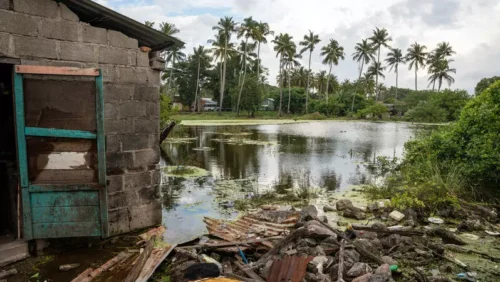The parliament of Honduras is about to pass a law that would simplify the granting of environmental permits without taking human rights into account in the text. The last remaining discussion in plenary could take place in the next few days. Parliament must refrain from passing a law that could jeopardize the rights to a healthy environment, to information and to participation in public affairs.
Amnesty demands:
- I hereby call on you to ensure that legislative changes relating to the environment do not pose a threat to human rights.
- Please refrain from passing the bill until it contains clear human rights safeguards, particularly with regard to public participation and the right to a safe and clean environment.
The special law to promote investment through the efficiency of environmental licensing procedures, which was presented to the Honduran parliament at the beginning of May, is a cause for concern.
The bill, which aims to simplify the granting of environmental permits for a large number of investment projects, makes no reference to the state’s obligations to guarantee human rights in accordance with international human rights norms and standards. It does not address the impact of this simplified mechanism on the right of individuals and groups to be involved in decision-making processes that may affect their rights, nor does it address the safeguards provided to ensure the right to a healthy environment. Nor does the current text reflect the requirement to comply with human rights due diligence to assess risks and impacts that the project may have and to establish an adequate plan to prevent these risks from having negative impacts. This process must take place prior to license approval.
While it has been announced that amendments to exclude mining projects from this mechanism and to guarantee the right to free, prior and informed consultation will be discussed, these have not yet been published and therefore remain unclear. Furthermore, no references to other human rights such as public participation have been announced.
Please demand the rejection of the bill!
Link to action (german): Website of Amnesty International Germany
Background
The draft special law to promote investment through the efficiency of environmental approval procedures is very general and vague. As all types of so-called investment or development projects appear to meet the conditions of the proposed simplified process, this could lead to the ordinary environmental approval process being bypassed.
Of particular concern is the lack of an adequate mechanism for the right of individuals, communities and groups to participate in decision-making processes, as this could have an impact on their human rights.
In recent years, the Honduran authorities have failed to set a clear course for the protection of the right to a healthy environment and the people who defend it. In February 2024, Parliament passed Decree 18-2024, which aims to ensure the effective protection of all protected areas in Honduras and restore the original layout of the Carlos Escaleras National Park in Tocoa in the department of Colón. However, the decree has not yet been implemented.
Environmentalists and organizations repeatedly go to court to denounce crimes and human rights violations in connection with investment projects. They pay a high price for this, often even with their lives. According to the NGO Global Witness, Honduras is the country with the highest number of murdered environmental activists in the world in relation to the total population. The attacks have mainly taken place in the wider context of disputes and human rights violations related to mining projects, insecure land tenure and the violation of the rights of indigenous communities and Afro-Hondurans.
This was also the case with the murder of Lenca environmental activist Berta Cáceres in 2016, who had denounced irregularities in the granting of permits for the Aguas Zarca hydropower project and violations of the human rights of indigenous communities. In May 2024, two people were found guilty of fraud and another person was found guilty of usurpation of authority and falsification of documents in this case
In a similar context, environmental activist Juan López was murdered on 14 September 2024 after he and other members of the community organization Comité Municipal por la Defensa de los Bienes Comunes y Públicos had been denouncing the violation of their rights to clean water and other human rights in connection with a mining project in the Carlos Escaleras National Park for years. In May 2025, the Attorney General’s Office brought charges against three people for the alleged crimes of illegal exploitation of natural resources and causing serious damage in connection with a megaproject in the national park and its surroundings. In a parallel criminal case, the Secretary General of the municipality of Tocoa is accused of altering a consultation act to enable the granting of environmental permits.
Honduras has not yet ratified the Regional Agreement on Access to Justice, Information and Public Participation in Environmental Matters in Latin America and the Caribbean (Escaszú Agreement).

